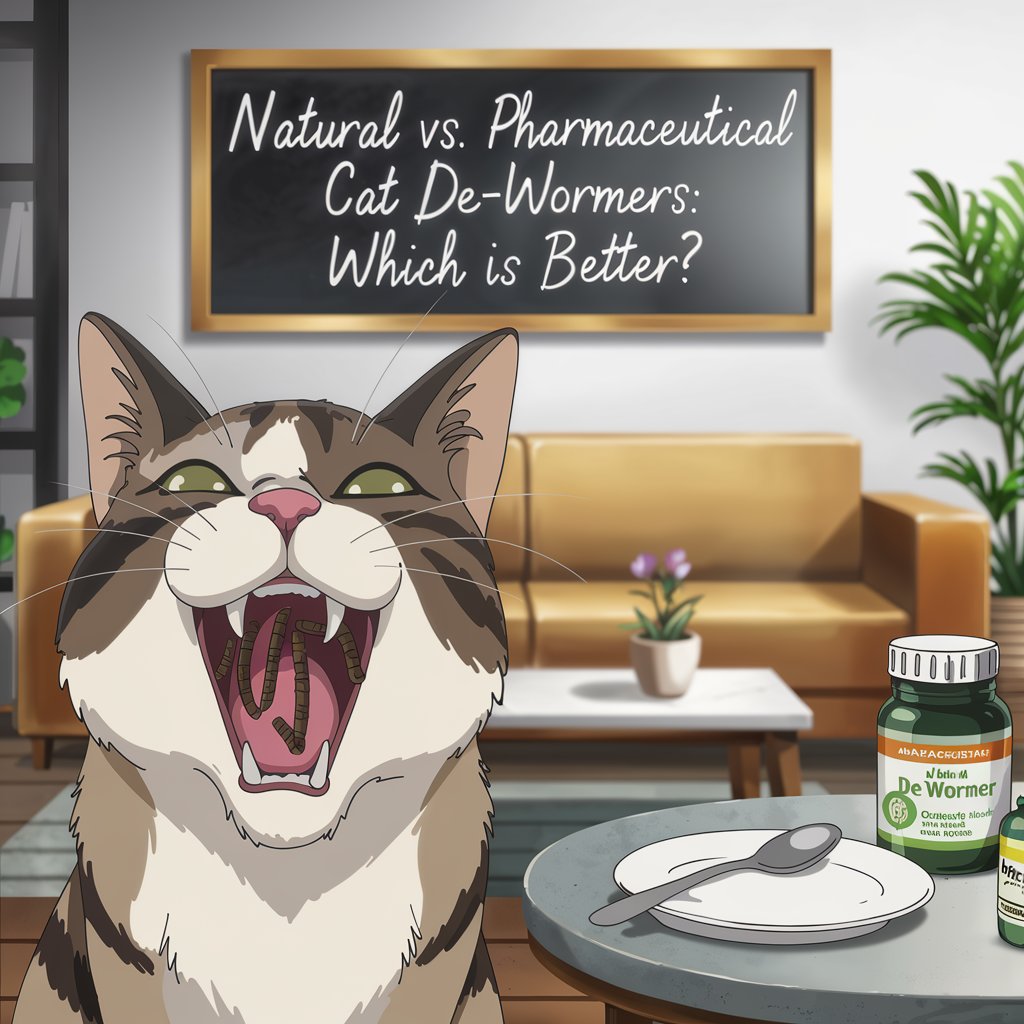When it comes to the health of your feline friend, ensuring they are free of internal parasites is crucial. Worm infestations can lead to various health issues, ranging from mild discomfort to serious complications. With a plethora of options available on the market, choosing the right de-worming solution can be daunting. In this article, we will explore the pros and cons of natural vs. pharmaceutical cat de-wormers to help you make an informed decision.
Understanding Cat Worms and Their Impact
Before diving into the comparison, it’s important to understand the types of worms that commonly affect cats and the potential health risks they pose. The most common types of worms include:
- Roundworms: The most prevalent intestinal parasites in cats, which can cause vomiting, diarrhea, and poor growth.
- Tapeworms: Often contracted through fleas, tapeworms can lead to weight loss and digestive issues.
- Hookworms: These can cause anemia and are particularly dangerous for kittens.
- Heartworms: Though less common in cats than dogs, heartworms can be fatal and require immediate treatment.
The Appeal of Natural Cat De-Wormers
Natural cat de-wormers are becoming increasingly popular among pet owners who prefer holistic approaches to pet care. These remedies often include ingredients like pumpkin seeds, garlic, and certain herbs. Let’s examine the benefits and potential drawbacks of using natural de-wormers.
Pros of Natural De-Wormers
- Fewer Side Effects: Natural remedies are generally gentler on a cat’s system, reducing the risk of side effects like vomiting or diarrhea.
- Chemical-Free: For those concerned about exposing their pets to synthetic chemicals, natural de-wormers offer a safer alternative.
- Improved Overall Health: Some natural ingredients, such as pumpkin seeds, offer additional health benefits like improved digestion and nutrient absorption.
- Environmentally Friendly: Natural de-wormers are often made from sustainable sources, reducing their environmental impact.

Cons of Natural De-Wormers
- Limited Efficacy: Natural remedies may not be as effective against severe infestations, especially for more resilient worms like tapeworms or heartworms.
- Slower Action: Natural de-wormers typically work slower than pharmaceutical options, which may prolong the infestation period.
- Inconsistent Dosage: The potency of natural remedies can vary, leading to inconsistent results.
- Lack of FDA Regulation: Most natural remedies are not FDA-approved, which can raise concerns about their safety and efficacy.
The Power of Pharmaceutical Cat De-Wormers
Pharmaceutical de-wormers are the most commonly used treatments for cat worm infestations. These medications are typically prescribed by veterinarians and have been thoroughly tested for safety and efficacy. Here are the key benefits and potential drawbacks of using pharmaceutical de-wormers.
Pros of Pharmaceutical De-Wormers
- High Efficacy: Pharmaceutical de-wormers are highly effective against a wide range of worms, including those that are difficult to eliminate with natural remedies.
- Rapid Action: These medications typically work quickly, often within hours or days, to eliminate worms from your cat’s system.
- Precise Dosage: Pharmaceutical de-wormers come in specific dosages, ensuring consistent and effective treatment.
- Veterinarian-Approved: These treatments are usually prescribed by veterinarians, offering peace of mind that they have been professionally vetted.
Cons of Pharmaceutical De-Wormers
- Possible Side Effects: Some cats may experience side effects such as vomiting, diarrhea, or lethargy after taking pharmaceutical de-wormers.
- Chemical Exposure: Pharmaceutical options often contain synthetic chemicals, which may be a concern for some pet owners.
- Resistance: Over time, worms can develop resistance to certain medications, making them less effective.
- Environmental Impact: The production and disposal of pharmaceutical products can have a greater environmental footprint compared to natural alternatives.
Comparing Costs: Natural vs. Pharmaceutical
Cost is another factor that many pet owners consider when choosing between natural and pharmaceutical de-wormers. Let’s break down the potential expenses associated with each.
Natural De-Wormers
- Upfront Cost: Natural de-wormers can be more affordable upfront, especially if homemade remedies are used.
- Long-Term Cost: However, because they may require more frequent use or additional treatments, the long-term cost can add up.
Pharmaceutical De-Wormers
- Upfront Cost: Pharmaceutical de-wormers tend to be more expensive upfront, particularly if a veterinarian’s prescription is required.
- Long-Term Cost: The long-term cost may be lower, as these treatments are often more effective and require fewer doses.
Efficacy: How Well Do They Work?
The efficacy of a de-wormer is perhaps the most important consideration. While natural de-wormers have their benefits, pharmaceutical options are generally considered more reliable for completely eliminating worms.
Natural De-Wormers
- Effectiveness: Effective for mild infestations or as a preventive measure.
- Limitations: May not fully eliminate severe infestations, and results can be inconsistent.
Pharmaceutical De-Wormers
- Effectiveness: Highly effective for treating all types of worm infestations.
- Limitations: Requires proper dosing and may lead to side effects in some cats.
Safety Considerations
When choosing a de-wormer, safety is paramount. Both natural and pharmaceutical options have their own safety profiles that should be considered.
Natural De-Wormers
- Safety: Generally safer with fewer side effects, but the lack of regulation can be a concern.
- Risks: Potential for inconsistent dosing and the presence of allergens in some ingredients.

Pharmaceutical De-Wormers
- Safety: Regulated and tested, with clear dosing instructions.
- Risks: Possible side effects, particularly in cats with pre-existing conditions or allergies.
Convenience: Which Is Easier to Use?
The ease of administration is another important factor for cat owners.
Natural De-Wormers
- Administration: Often administered orally or mixed with food, making them easy to give to cats.
- Frequency: May need to be administered more frequently than pharmaceutical options.
Pharmaceutical De-Wormers
- Administration: Available in various forms, including tablets, liquids, and topical treatments.
- Frequency: Typically require less frequent dosing due to their potency.
Final Verdict: Natural vs. Pharmaceutical Cat De-Wormers
So, which is better: natural or pharmaceutical cat de-wormers? The answer depends on your cat’s specific needs and your personal preferences as a pet owner.
- For Mild Infestations or Preventive Care: Natural de-wormers may be sufficient, especially for cat owners who prefer a holistic approach.
- For Severe Infestations or Guaranteed Results: Pharmaceutical de-wormers are the better choice due to their proven efficacy and rapid action.
Ultimately, it’s important to consult with your veterinarian to determine the best course of action for your cat. A combination of natural and pharmaceutical treatments may also be a viable option, providing the best of both worlds.











